Selection: 5 useful services for writing articles in English
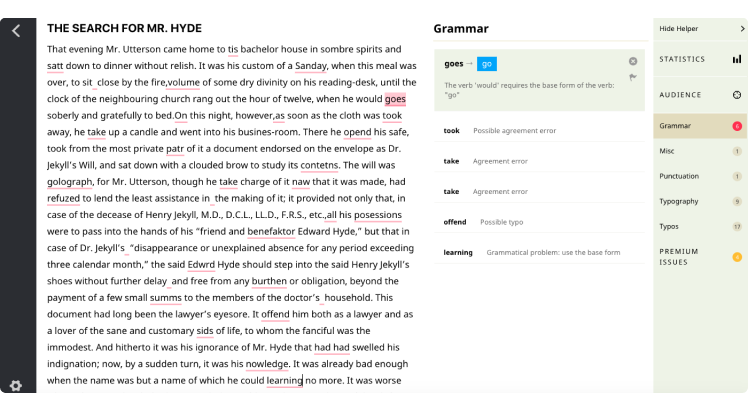
Hello! My name is Margo, I am a professional marketer and editor, in the last couple of years I have been focusing on promotion abroad and have been writing a lot in English. I decided to share links to applications and sites that help me in daily work when creating content. I hope the list will help students of English and those who publish English-language materials on Habré.
Textly.AI
For a non-native speaker, one of the most difficult moments when writing is grammar. You can study it as much as you like, but an automated verification tool never hurts. At the same time, if you are engaged in creating content professionally and regularly, then no free tools will help you at the proper level - it has been repeatedly checked on itself.
')
Through long experiments, I stopped at the Textly grammar checker service. He copes with typos - and I usually write quickly and make a lot of them. In addition, corrects explicit grammatical blunders. Conveniently, the application works as an extension for Chrome, so if I need to fix a blog post on WordPress or Medium, then I don’t have to copy and paste it anywhere.
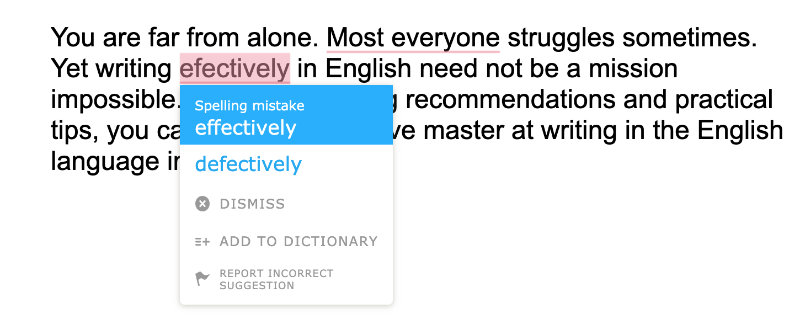
Tips from the browser plugin are shown in real time
In addition, the web version has a repository of documents, a dictionary where you can put those words that you do not want the robot to perceive as errors, and a real editor. This is not WYSIWYG, there is no formatting, but there is an interesting module for assessing the readability and complexity of the text. For example, I often find myself trying to make a sentence more impressive - a frequent error of non-carriers - and the program can tell when I put down a stick.
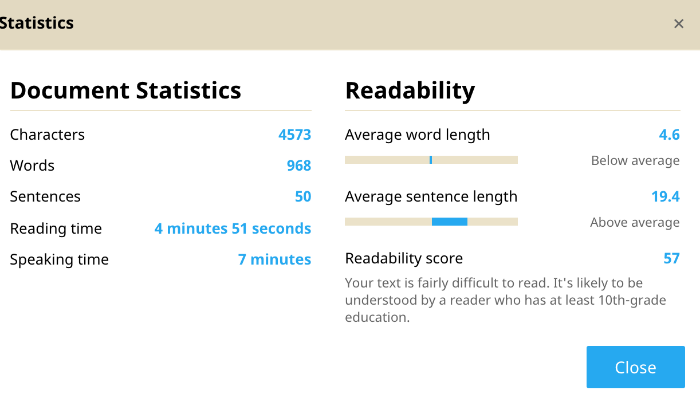
Answering an obvious question - of course, I tried Grammarly, but first of all, this service is expensive for me - $ 30 a month or $ 140 a year is a pity to pay, and $ 36 for a quarter in the case of Textly pays for itself. In addition, I do not like the approach of developers Grammarly to privacy issues (this is a good thread on Twitter on this topic) and the fact that this program often takes too much on itself. For example, in attempts to destroy the passive voice in any sentences, the service may go to the recommendations to remake the phrase “The car was parked by the sidewalk” in The sidewalk parked the car, which, to put it mildly, does not make sense.
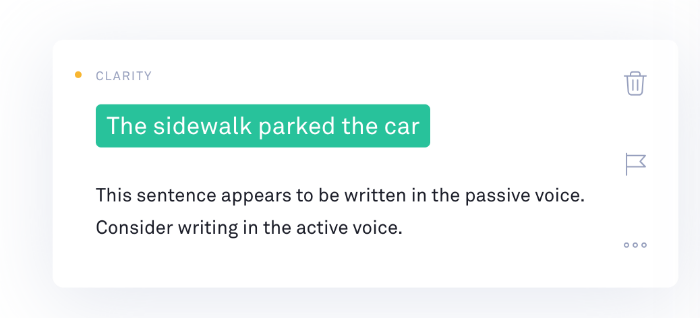
In any case, trusting only automated tools for correcting texts is not worth it, and they will not replace the human editor for a long time.
Vocabulary.com
Despite the frequent practice, no-no and yes, there are words in the meaning of which I am not sure, or have forgotten them. This is where the Vocabulary.com dictionary helps me. I came across this resource a few months ago and was very pleased. Its essence is that it does not just show the translation, but gives it in the form of explanations - it is very similar to how a native speaker explains the meaning of words to a friend to a non-carrier.
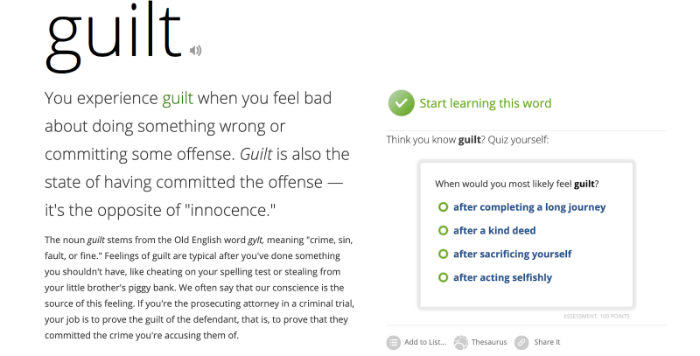
Here are examples of the use of the word in different phrases and situations, related words are given, you can even pass the test for knowing its meaning even on the same page. As a result, the meanings of new words are remembered with a bang, so the service is extremely useful in educational terms.
Upwork
Recently, I increasingly come across references to the service for prompt reading of Fluent Express. I used it a couple of times, but I can not say that it can seriously help the authors and editors. In the long term, it is the combination of these two specialists that plays an important role; when you get used to each other's style, the quality of the output content increases many times over.
My choice for finding editors is the Upwork website. It has many advantages: a huge number of native speakers with different levels of experience, living in different English-speaking countries. That is, you can easily find a specialist in Australian or New Zealand English.
It only took me a couple of times to publish the task “into the air” in order to select the group of editors with whom I have been working for almost two years now.

Since the competition between freelancers is high, they work quickly, they do not “break” prices, a standard blog post can be deducted for $ 10-20 - and this will make not a fluent express from Fluent Express, but a real expert with an open profile, reviews and so on.
You can always discuss edits, agree on discounts for the future, explain your vision of a particular point in the text - in general, you must use it when working on content in various Upwork languages. For example, through the service I recently did translations into Spanish and Chinese.
Hemingway app
Perhaps the most controversial service of those that I use. As far as I know, its creators are in the past professional PR specialists from the USA, so it is not surprising that the product has the most flattering press, it has repeatedly shone in publications of the level of Forbes and TechCrunch.
At the same time, often in different writing enhancement software, it is positioned as an alternative to the same Grammarly, but this is fundamentally wrong. The only thing Hemingway is for is style improvement. Moreover, the tool only shows problems, for example, it highlights very complex sentences, passive voice or incomprehensible language constructs, but does not offer any solutions.
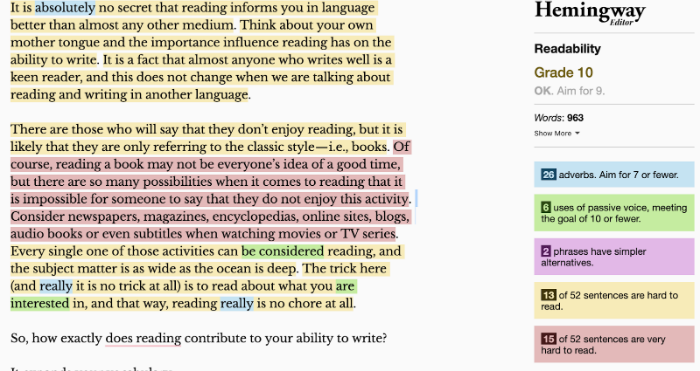
Thus, the tool is suitable only for quite experienced people who are able to independently interpret his advice. Anyway, it is necessary to apply it when working with the editor-neytivom found on Upwork - he will be able to more effectively apply the recommendations or abandon them as unnecessary in a particular case. For me, this particular scheme turned out to be the most effective.
Deepl
Another translation tool, but its specificity is different. Deepl uses a huge base of translations made by people to train their algorithms - as a result, they translate texts in the most “native” way, and not word for word they repeat the original sentence in conditional Russian only in English.
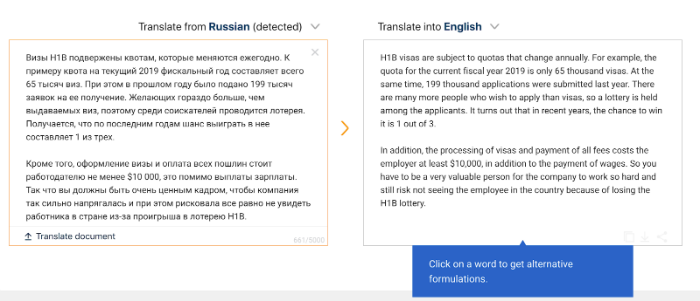
I used only the free version of the service, but even its functionality is impressive. For example, if in the resulting translation any word in the sentence is replaced with another, more appropriate meaning, the system will rebuild the whole sentence so that, again, everything looks as natural as possible. Initially, I was somewhat suspicious of such clever dictionaries, but after a week of use it became physically unpleasant to go to Google Translate.
In addition, Deepl is a great way to combat the fear of a white sheet. For example, it is sometimes difficult for me to start writing text in English, the brain resists and collapses into procrastination. In this case, you can quickly jot down the beginning of the text in Russian, translate qualitatively through the service, and add further - this is much easier psychologically.
Conclusion
By tradition, at the end of such articles, everyone writes that no additional software can replace a person. That's right, if you learn a language, the program will not learn it for you, and the robot will not write a great text for your corporate blog.
But using the right tools will allow you to seriously reduce the time and resource costs, and the output at the output will be comparable in quality to what the author-native speaker will write for much more money. Therefore, it is better to involve them as a final authority for proofreading texts that you wrote yourself with the help of online assistants.
Source: https://habr.com/ru/post/449518/
All Articles